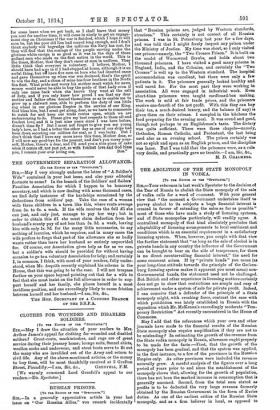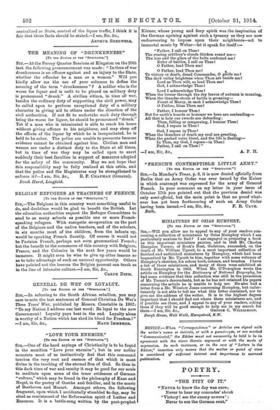THE ABOLITION OF THE STATE MONOPOLY IN VODKA.
[To THR EDITOR Or THR "Sritoreron.'l
SIR,—Your reference in last week's Spectator to the decision of the Tsar of Russia to abolish the State monopoly of the sale of vodka calls for a word of comment. With your general view that "the moment a Government undertakes itself to purvey alcohol to its subjects a huge financial interest is created in favour of extending the sales as far as possible" most of those who have made a study of licensing systems, and of State monopolies particularly, will readily agree. A centralized monopoly of that kind absolutely precludes that adaptability of licensing arrangements to local sentiment and conditions which is an essential requirement in a satisfactory licensing system. When, however, you couple with that view the further statement that "as long as the sale of alcohol is in private hands in any country the influence of the Government can be brought to bear on the side of temperance, for there is no direct countervailing financial interest," the need for some comment arises. If by "private hands" you mean (as your long-time attitude towards the principle of the Gothen- burg licensing system makes it apparent you must mean) non- Governmental hands, the statement need not be challenged. But British and other experience in licensing matters certainly does not go to show that restrictions are simple and easy of achievement under a system of sale for private profit. Indeed, I can conceive that a defender of the principle of a State monopoly might, with crushing force, contrast the ease with which prohibition was lately established in Russia with the opposition which Mr. McKenna's exceedingly moderate "Tern.. porary Restriction" Act recently encountered in the House of Commons.
May I add that the references which your own and other journals have made to the financial results of the Russian State monopoly also require amplification if they are not to be misleading ? In estimating the growth of the revenue from the State vodka monopoly in Russia, allowance ought properly to be made for the facts :—First, that the growth of the monopoly has been gradual, and that the system was applied, in the first instance, to a few of the provinces in the Russian Empire only. As other provinces were included the revenue naturally grew. A careful analysis of the figures over a long period of years prior to and since the establishment of the monopoly shows that, allowing for the growth of population, there has not been the marked increase in consumption that is generally assumed. Second, from the total sum stated as profits is to be deducted the very large revenue formerly obtained by the Russian Government in the form of Excise duties. As one of the earliest critics of the Russian State monopoly, and as a firm believer in local, as opposed to
centralized or State, control of the liquor traffic, I think it is fair that these facts should be sta.ted.—I am, Sir, &c., ARTHUR SHERWELL.



































 Previous page
Previous page